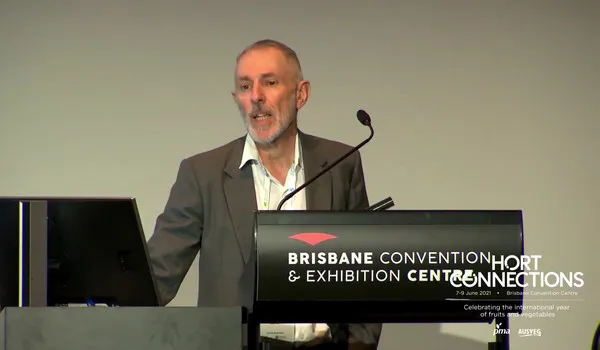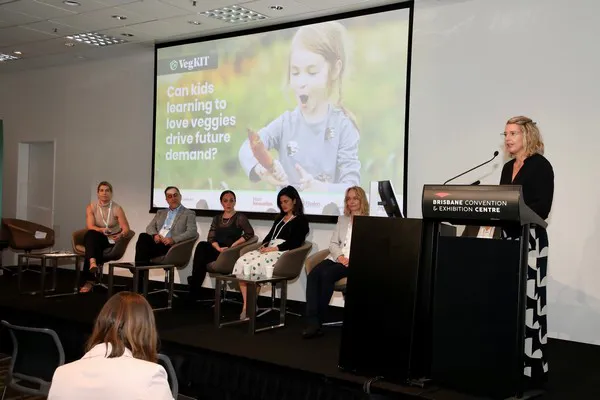Getting children to eat as little as half a serving more vegetables a day could increase demand by nearly 20,000 tonnes each year, according to researchers involved in a new project aimed at increasing consumption.
David Cox is a Principal Research Scientist at the CSIRO, and he says only around six per cent of children are receiving the recommended intake of vegetables, which usually carries on into adulthood.
"So, the demand for your produce has basically flatlined, and we need to do something about it," he said. "So what's the opportunity? We are planning in the long term to increase intake by half a serving, and that has the potential to increase demand; if every child in the country, aged 2-6, increases by half a serving, it will increase demand by 19,000 tonnes annually."
Mr Cox is the leader of the new VegKIT project, which provides tools and interventions to increase children's vegetable intake. This project has been funded by Hort Innovation, using the vegetable research and development levy and contributions from the Australian Government, and has several stakeholders made up of 20-25 people including Flinders University and Nutrition Australia.
"We have best practice guidelines in childcare centres and schools," Mr Cox said. "We also have an online registry and have invited people to put their initiatives on, which we are reviewing through an expert panel. The idea here is to enhance the efficacy of the interventions through knowledge sharing and better practice. Supporting all of this we have a Vegetable Intake Strategic Alliance, which is about disseminating knowledge and sharing it because we cannot achieve anything without a range of stakeholders."
 Photo: David Cox from the CSIRO
Photo: David Cox from the CSIRO
But he says that his team has looked at the scientific evidence surrounding what works and determined that current guidelines are quite vague.
"They are not actionable and not vegetable specific, so they need to be strengthened," Mr Cox said. "What we know is that repeated exposure to a variety of vegetables can teach children to learn to like them. So, all of that is being built in and disseminated. We have a couple of sets of interventions, one of the activities is working in long child care. This has 4-5 components to it, and one of those is direct supply. Currently, it's a bit ad hoc, and a bit expensive as child care centres are currently going to the supermarkets. So, we are working on a direct delivery system, and menu support, as well as training and making it more vegetable specific. We are providing teaching resources in the form of curriculum activities. Another intervention is in schools, and we started through a menu analysis and discovered there isn't that much in terms of offerings in terms of vegetables - so we are looking at opportunities there."
Tara Leong, a qualified nutritionist, says a major positive of the VegKIT program is that it looks at the science and explores ways that children can be taught to enjoy vegetables, rather than it being seen as a chore that they must do, often reluctantly.
"I know that if I went to dinner with my husband and he told me that we weren't having dessert until I ate my corn, I would not enjoy that corn and I'd be pretty cranky," she said. "That's the same with children; we stand over them and tell them to eat their vegetables. That clearly isn't working and VegKIT is looking at other ways to do this. The science is that children aren't eating enough vegetables and they grow into adults who don't eat vegetables. So, childhood is the moment we can capture them and try and introduce vegetables to them. If kids are eating them, parents will buy them. So, it's about changing the way we teach children about vegetables and getting our kids to love them. It has to change from forcing them to eat it, to getting them to explore the taste, texture and the enjoyment."
 Photo: Belinda Adams, Coastal Hydroponics; John Simonetta, Perfection Fresh Australia; Tara Leong, Nutritionist; Shadia Djakovic, Healthy Kids Association; Astrid Poelman, CSIRO; and Claire Gardner, Flinders University Caring Futures Institute (standing)
Photo: Belinda Adams, Coastal Hydroponics; John Simonetta, Perfection Fresh Australia; Tara Leong, Nutritionist; Shadia Djakovic, Healthy Kids Association; Astrid Poelman, CSIRO; and Claire Gardner, Flinders University Caring Futures Institute (standing)
From a grower/producers perspective, John Simonetta from Perfection Fresh Australia says it is important to create opportunities for consumers to utilise products at different times, for example, his company's snacking varieties, and if children are consuming fresh produce at a young age, it is only going to grow the demand base.
"A few responsibilities of being a grower is supplying safe food, and we need to make them accessible," he said. "We need to do this through marketing, that's one of the steps. Another tactic we had, when we launched our Broccolini range, was to go to foodservice and restaurants and try and get it on the menu. That then built the awareness into retail, and we used our network and partners to give us the 'showroom' to allow consumers to buy our products. In terms of children, we should be using that tactic but in child care centres. There is an opportunity to build awareness and consumption from that point."
For more information on the VegKIT program, visit: www.vegkit.com.au
